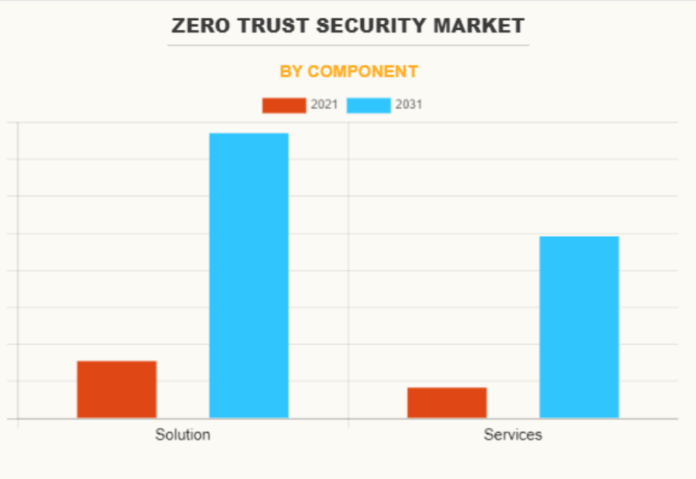Increased investments in zero trust security solutions among countries such as China, Japan, India, Australia, South Korea, and the rest of the Asia-Pacific fuel growth.
WILMINGTON, DE, UNITED STATES, November 20, 2023 /EINPresswire.com/: According to a new report published by Allied Market Research, titled “Zero Trust Security Market, by Component (Solution, Services), by Deployment Model (On-premise, Cloud), by Enterprise Size (Large Enterprises, SMEs), by Authentication (Single-factor Authentication, Multi-factor Authentication), by Industry Vertical (BFSI, Government, IT and Telecom, Manufacturing, Healthcare, Retail, Energy and Utilities, Others): Global Opportunity Analysis and Industry Forecast, 2021-2031″.
The zero trust security market was valued at $23.61 billion in 2021 and is estimated to reach $126.02 billion by 2031, growing at a CAGR of 18.5% from 2022 to 2031.
Download Sample Report: https://www.alliedmarketresearch.com/request-sample/17490
The global zero trust security market is influenced by a number of factors, including the use of big data platforms, measures to cut down on office paper usage, and strengthened information security. However, the restraints include recurring expenses.
Asia-Pacific is expected to observe the highest growth rate during the forecast period. An increase in investments in zero trust security solutions among countries such as China, Japan, India, Australia, South Korea, and the rest of Asia-Pacific fuels the growth of the market. Moreover, the major factor contributing toward the adoption of zero trust security solutions in Asia-Pacific is the increase in usage of mobile data for various applications such as mobile banking and social media. In addition, the surge in penetration of smartphones and the internet in countries such as India and China has fueled the adoption of zero trust security in this region. Additionally, the rise in the need to support secure enterprise mobility practices within organizations is expected to boost the demand for zero trust security solutions. Furthermore, the ease of accessing the internet for the general population, along with the launch of low-cost smartphones, is encouraging organizations to implement effective zero trust security solutions.
Inquiry Before Buying: https://www.alliedmarketresearch.com/purchase-enquiry/17490
Competitive Analysis:
The competitive environment of the zero-trust security industry is further examined in the report. It includes details about the key players’ strengths, product portfolio, and zero trust security. Market share and size analysis, operational results, and market positioning. It comprises the actions taken by the players to grow and expand their presence through agreements and entering new business sectors. Mergers and acquisitions, joint ventures, and product launches are some of the other techniques used by players.
Key Players:
Cisco
Akamai
IBM
ZScaler
VMware
Microsoft
Cloudflare
Google
Cyxtera Technologies
SonicWall
Palo Alto Networks
Check Point Software Technologies
Trend Micro, Inc.
Symantec Corp.
FireEye, Inc.
McAfee Corp.
forcepoint and many more
Region-wise, North America is the leading region in terms of technological advancements and adoption. It possesses a well-equipped zero-trust network infrastructure and the ability to afford zero-trust security solutions. Furthermore, owing to the rise in competition between cloud-based service providers in North America, key players are providing more security for data by ensuring quick access and greater outreach of their services to clients, which drives the growth of the zero trust security market in this region. In addition, the major factors that contribute to the growth of zero trust security in North America are the increase in mobile and web usage. In addition, the increase in dependency on the internet and social media platforms is another major factor fueling the growth of the zero-trust security industry in this region.
Buy Now: https://www.alliedmarketresearch.com/checkout-final/46dc4bc4c7d680d3be4a724f8017b986
Post-COVID-19, the zero trust security market size is estimated to grow from $23.61 billion in 2021 to $126.02 billion by 2031, at a CAGR of 18.5%. It is projected that the COVID-19 outbreak will benefit the development of the zero-trust security business. This is due to the fact that the implementation of zero trust security during COVID-19 will make it possible for businesses to handle security concerns and provide secured information access when conducting remote operations. In addition, due to an increase in internet traffic, the risk of cyberattacks has grown significantly in a number of enterprises, driving the demand for zero-trust architecture solutions. Cloud security, AI-integrated solutions, and an increase in cyberattacks following the advent of this pandemic have all contributed to innovations and advancements in cybersecurity solutions that have further supported market growth.
For instance, as per a survey by the Information Systems Security Association (ISSA) and ESG conducted in April 2020, the cybersecurity industry witnessed an almost 63% increase in cyberattacks related to the pandemic. Thus, the increase in the risk of cyberattacks augments the demand for zero-trust security solutions and services, thereby fueling the growth of the zero-trust security industry market.
Do Follow: CIO News LinkedIn Account | CIO News Facebook | CIO News Youtube | CIO News Twitter
About us:
CIO News, a proprietary of Mercadeo, produces award-winning content and resources for IT leaders across any industry through print articles and recorded video interviews on topics in the technology sector such as Digital Transformation, Artificial Intelligence (AI), Machine Learning (ML), Cloud, Robotics, Cyber-security, Data, Analytics, SOC, SASE, among other technology topics.






